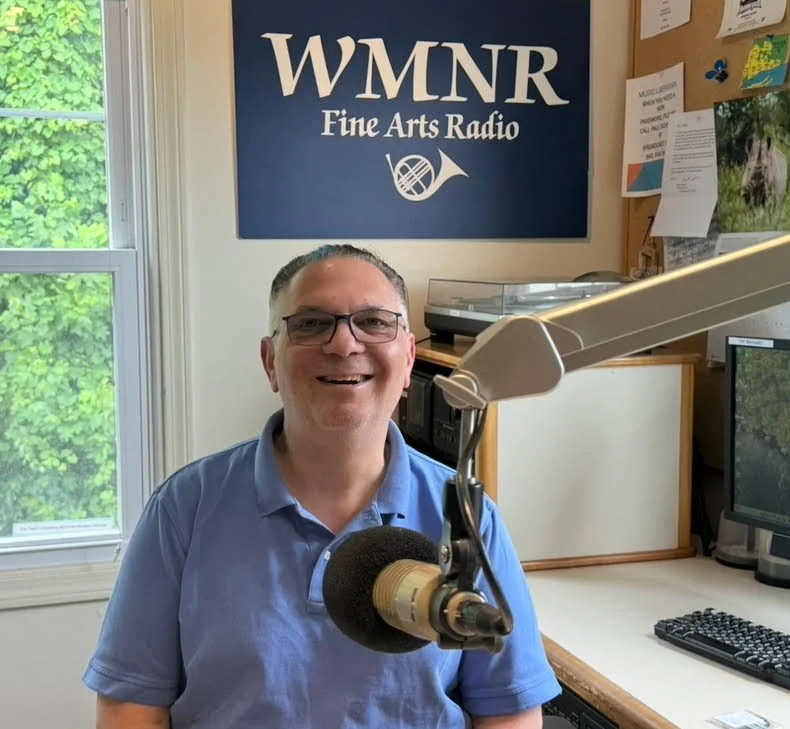Tuesday Afternoon Classics, 3:00 to 5:00 PM
Wednesday Morning Classics, 8:00 AM to Noon
“Music has always been a part of my life and I think the newest iteration of that passion is becoming a broadcaster at WMNR Fine Arts Radio.”
How were you originally drawn to classical music? In your childhood, your education, as a performer?
“All three! My father was passionate about music. He was a percussionist as a kid and music was a tremendous part of his life. There was a piece of furniture in our living room. The top was a 12” television and the lower half was a turntable with a little amp and a speaker or two. By age two, I knew how to play music on the turntable. The 20 or so albums in the house were symphonic music, opera, and Broadway.”
Michael says that as often as they could, his parents would attend a Broadway show and about the time he was six, he started attending concerts and shows with them and his sister (a second sister yet to be born would join them later).
In the summers Michael went to a bungalow colony in the Catskills and a neighbor there was a musician. He worked in the beauty industry but on Saturday nights he played venues around the Catskills. Michael was fascinated overhearing his warm up and took up the clarinet as a school kid. His first teacher was in a quartet with a future Juilliard grad and that group also played up in the Catskills and let Michael sit in the pit during performances.
He started private lessons around 4th grade and progressed to needing more advanced instruction. His bar mitzvah band invited him up for a set in front of 250 people at age 13! Heading toward high school he had to choose between baseball or music. He chose music and was concertmaster of his high school concert band.
The conductor was clarinetist Martin Moser who was also assistant conductor of the NYC All-City High School Concert Band, made up of 115 elite music students from around the city and Michael joined that ensemble too. The principal conductor of the ACHSCB was Gabriel Kosakoff who was also an educator at Tanglewood. Michael auditioned each year of high school to retain his spot. As he advanced, he came under the tutelage of Richard Stolzman for 4 to 5 years as a private student. Around this time he also recalls how Joe Allard became his saxophone teacher in the Carnegie Hall Tower.
Michael continued to perform while at Hofstra University earning a BBA in Finance. While successfully auditioning into the concert band, he was scouted for Hofstra’s production of “The Threepenny Opera.” For four years he performed in shows like “Guys and Dolls” and “Gypsy.” By now a union member, he played the full family of clarinets (plus the family of saxophones and the flute too) so as to be able to play in pit orchestras and did summer stock pit work and played bar mitzvahs, weddings, and dinner dates. The B-flat clarinet is his principal instrument.
His eventual career led to work in the television and motion picture technology industry. He found this community rich in people who were exposed to the performing arts. Michael is also a licensed conductor in freight and passenger rail service and an instructor. Like music, he sees the roots of this avocation in his childhood home; looking out the window at the 4-track mainline of the New York Central railway.
How did you hear about becoming a broadcaster?
“I heard an on-air announcement as a listener. My wife and I moved to Connecticut in February 1996 and we found the station randomly on FM. Not much comes in around our house. We’ve been listening on 88.1 FM for 25 years.”
What might a listener expect from your program?
“I have alway found that most people are not attuned to how much classical music they are exposed to in their daily life. Movies, television, commercials, cartoons! I think I want to make sure I engage people in a way that feels familiar; even if they couldn’t name the piece, like musical themes or melodies that people may have heard before but don’t associate with a concert hall. I’d like to reinforce the idea that classical music is all around us.” Micheel enjoys listening to clarinet music and played a Mozart work by Sabine Meyer in one of his demo programs which led WMNR GM Kurt Anderson to uncover his background in clarinet. Board Operator Robin Rockwell who produced Michael’s demos is also a clarinetist and he appreciated that aspect of his training.

